MLM companies are recognized for their distinctive approach to sales and distribution of products and services. This approach centers on a network of distributors or representatives who not only sell products but also manage their downline teams.
While the unfortunate reality is that many MLM companies face significant challenges and, in some cases, fail. However, with a comprehensive understanding of the root cause and implementing the right marketing strategies, these failures can be potentially transformed into MLM success stories.
So, why does MLM companies fail? Let’s dive into the 10 most important reasons along with the solutions to tackle this million-dollar question.
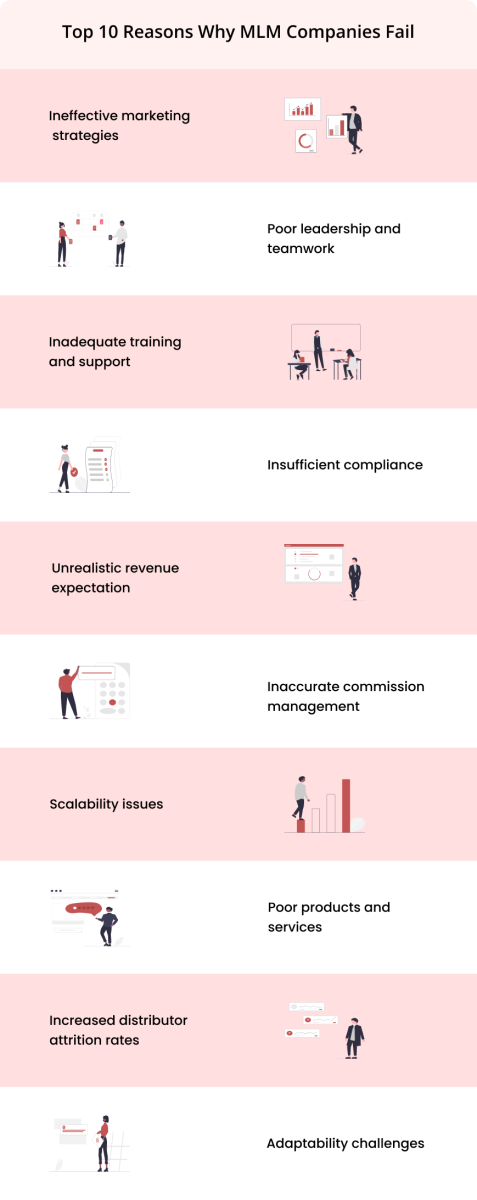
1. Ineffective marketing strategies
Those marketing strategies that can cost businesses time, money, and opportunities are deemed ineffective. They can be significant blocks that drain valuable resources, slow down progress and potentially damage a brand's reputation, ultimately impacting overall performance of the company.
The ineffective strategies includes

Inability to convey the value of your products

Targeting the wrong audience

False promise
This can shorten the company's longevity in the marketplace.
A strategy to enhance efficiency

Comprehensive market research: Investing more in understanding customer behavior, patterns, preferences, and pain points.

Align with growth goals: Optimizing marketing campaigns to avoid targeting the wrong audience, prioritizing customer-centric approach, and leveraging data analytics to make informed decisions.

Adapt to the changing trends: To stay ahead of the competition, businesses can keep an eye on industry developments, technology advancements, and research on consumer attitude for shaping their marketing strategies accordingly.

MLM software integration: Employing MLM software with marketing automation can streamline marketing efforts through dynamic features, such as replicated websites with a perfectly crafted network marketing website design for each individual distributor, MLM integrated ecommerce for streamlining the purchasing process, affiliate plugin programs for managing and tracking affiliate marketing efforts, and referral links for enabling distributors to refer new prospects. Additionally, the software provides ready-to-launch tools that includes, campaign templates, landing pages, promotional banners, and digital ads.
By implementing these effective marketing strategies into your business, you can streamline operations, navigate toward result-driven growth, foster expansion, boost brand awareness, and ultimately attain your marketing objectives. Gaining insights from past failures and staying agile in your approach will prove instrumental in securing long-term success.
2. Poor leadership and teamwork
Ineffective leadership qualities end up in declining sales, thereby affecting a company’s bottom line. How can you determine if such ineffective leadership qualities exist? Here are some additional thoughts on this:

Lack of clear vision results in distributors experiencing uncertainty regarding their roles in customer acquisition and retention.

Leaders struggle to communicate expectations, strategies, and goals effectively, leading to misunderstandings and misalignment within the organization.

Inadequate training which is associated with ineffective leadership.

Lack of accountability, where distributors and team members do not feel responsible for their roles in network marketing.
Transforming inadequacies into strengths
The cornerstone of success in the business world is when true MLM leaders emerge. As Dexter Yager, ‘Grandfather of network marketing’ and ‘The Father of Modern MLM’, makes it simple,
“Each leader works primarily for you and not you for him. This isn’t full-time job but partnership in business, where people who know and can do more teach you thanks to which you can become a leader.”
Dexter Yager

As we agree on Dexter, let us identify the ways to address this challenge.
Optimizing communication: Enhance communication efficiency within your team by streamlining communication channels.
Utilizing a voice, video, and screen-sharing-enabled platform with one-on-one and group messaging.
Focussing on the essentials: Prioritize key objectives while efficiently scheduling and managing crucial tasks to attain sales goals.
Using a single platform to display individual goals and tasks on dashboards with deadline reminders.
Brainstorming sessions: Welcome innovative business ideas and cultivate creativity through collaborative brainstorming sessions.
Engaging individuals in group discussions, sponsor support communities, and online forums.
Building strong remote teams: Foster remote work culture enabling teams to work effectively from diverse locations with online collaboration tools.
-
Hosting online meetings, events, and training sessions to enhance remote team engagement.
-
Leveraging online chat, presentation, and file-sharing tools to facilitate seamless communication and task progress discussions among team members.
Enhancing productivity with automation: Leverage automation tools for increased efficiency.
-
Implementing AI-powered chatbots for client as well as sponsor support.
-
Developing automated training sessions to enhance the performance of the team.
Tracking team performance: Establish performance metrics such as sales, commissions earned, and training courses completed, to monitor and improve team effectiveness.
Displaying rank advancements on a goal roadmap, while visualizing goals, not only boosts healthy competition but also encourages distributors to achieve the next level at a faster pace.
Recognizing team efforts: Motivate and incentivize team members by acknowledging their contributions and accomplishments.
Showcasing the achievements of distributors and representatives on leaderboards.
Building supportive networks: Develop a culture of support and professional growth within the team.
-
Conducting sponsor-led training sessions for skill improvement and mentorship programs.
-
Involving team members in decision-making and problem-solving.
-
Establishing resourceful support teams with experienced sponsors to ensure continuous assistance for team members.
MLM is always about creating a path toward financial independence and entrepreneurial success. Within this dynamic industry, distributors emerge as the true leaders, setting the course and building successful teams.
Such successful teams share their insights, resources, and strategies in order to support one another. It exemplifies effective collaboration and team building.
We should also take note that this is not a one-time event. It is an ongoing process that significantly contributes to the long-term success of the direct selling industry.
3. Inadequate training and support
In their haste to stay ahead of competitors, many MLM companies focus on scaling up sales before training the distributors. Here we can get a closer look at how this impacts the failure of people in network marketing.
Lack of product knowledge as distributors may not fully understand the products or services they are selling. This may lead to difficulties in effectively communicating the value of the products to potential customers.
Ineffective sales techniques that may hinder rather than facilitate the sales process. This leaves no room for distributors to achieve growth.
High customer attrition rates as distributors are not trained to build and maintain customer relationships. This means that they constantly need to acquire new customers. It can be exhausting and unsustainable, often resulting in less attention to retaining current customer base.
Compliance and legal issues that can lead distributors to inadvertently engage in practices that raise legal concerns, potentially leading to regulatory scrutiny.
Upgrading resources to next level
Leveraging tools such as the Learning Management System (LMS) for conducting training sessions that incorporate assessments, quizzes, and other interactive elements, enhances distributor learning experience. Furthermore, a distributor training platform is essential to fine-tune every aspect of their direct selling career.
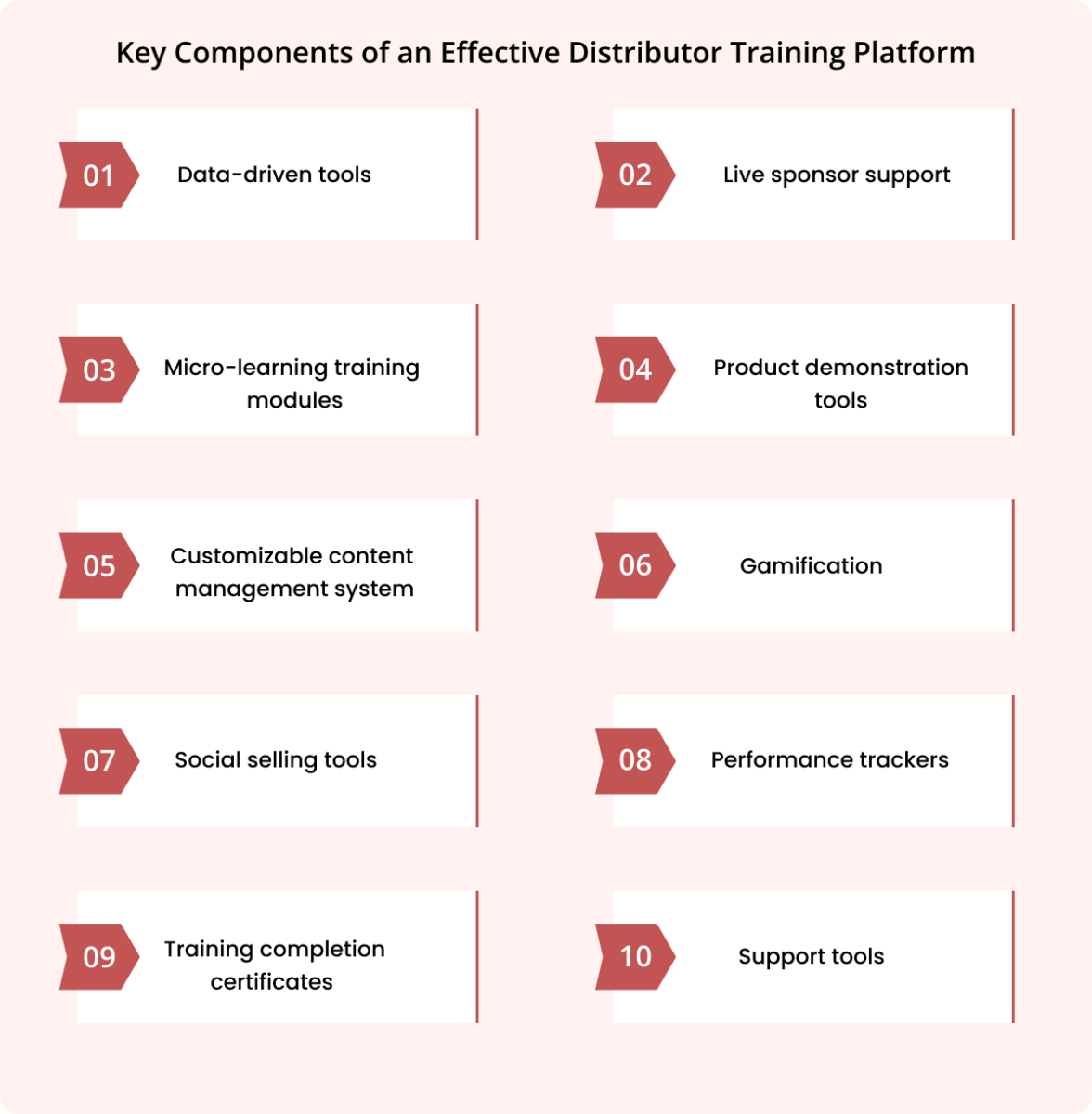
Along with training modules that are designed to motivate and encourage distributors, they also incorporate structured onboarding and induction processes, providing new distributors with a comprehensive starting point for their journey.
One of the first goals of human-centric companies like direct selling, must be to upgrade distributor performance through proper training and support. This helps overcome organizational challenges and work out specific strategies that improve efficiency with quality outcomes.
4. Insufficient compliance
The next blow comes when distributors are unaware of the legal policies and procedures. It is the most susceptible risk MLM businesses encounter. When distributor actions are deemed illegal or non-compliant, then a serious breach of brand trust emerges.
Key consequences of non-compliance includes:
Legal problems for direct selling companies and their distributors.
Damage to reputation leading to difficulties in attracting and retaining customers and distributors for legitimate companies.
Consumers at risk due to false product claims, misleading income promises, and other deceptive practices.
Non-compliance can raise concerns that an organization may be operating as a pyramid scheme.
Sustainability issues as the companies may face increased operational costs to address legal problems, settle disputes, and implement compliance measures.
Decline in sales as there would be no more repeat purchases or customer referrals.
Market saturation as companies flood the market with products or distributors.
From learning to doing is compliance
Compliance is all about adhering to regulations, guidelines, mandates, and laws set by the government or its agencies for different industries and their subdivisions. One such government agency is Federal Trade Commission (FTC) that focuses on protecting the public from deceptive or unfair business practices.
So, are we now ready to elevate your compliance game?
Let's get started!
Comprehend and comply: Direct selling companies should have a clear understanding of the legal framework applicable to their industry. They should also ensure that their business practices align with these laws and regulations.
Transparency: Regulatory authorities and governing bodies, notably DSA and DSSRC, require businesses to be transparent in their interactions. This includes sharing accurate information about products, compensation structures, and potential risks. One effective approach to ensure transparency, trust, and integrity in the direct selling industry is by utilizing Income Disclosure Statements (IDS). With comprehensive commission payout disclosures, businesses can further protect the interests of both distributors and consumers.
Proper compliance training: As we discussed above, network marketing companies should provide regular training and education to their sales representatives. By doing so, they stay informed about company's policies, compliance requirements, and ethical standards.
Ethical business practices: Following and enforcing ethical business practices drives away misleading marketing strategies. It gives birth to truthfulness and integrity in all business transactions.
Record maintenance: Accurate records of sales, commissions, and all financial transactions demonstrates your commitment to compliance and ensures seamless business operations.
Feedback: A suitable approach to improve and address compliance-related issues is when you begin to encourage feedback from customers and distributors.
Global perspective: When your business operates in multiple countries, it is important to be aware and comply with international regulations as well as local laws specific to each market.
Automated compliance monitoring has emerged as a solution to streamline compliance efforts and ensure transparency and accountability in business operations. Be it a startup MLM platform or an enterprise MLM platform, a rigid compliance monitoring system is a prerequisite before getting off the ground as it,
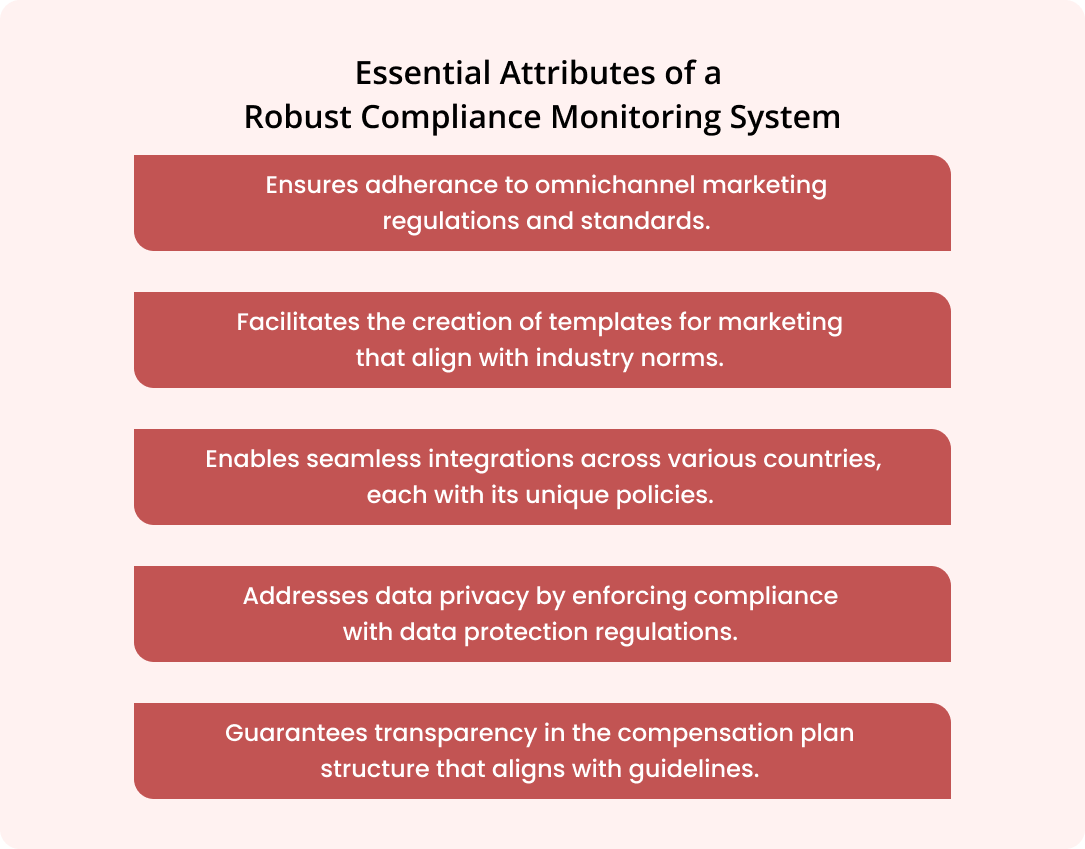
5. Unrealistic revenue expectation
Remember the last time you read about failed MLM companies only to find out how unrealistic the income expectations were?
These expectations resemble domino effect, where one wrong move can lead to a series of unprecedented consequences. One such wrong move is when MLM companies focus on recruitment over product sales. And what about the consequences?
High pricing for enrolment packages which makes it difficult for the potential distributors to afford.
Must becoming a distributor come with a high price tag? Unaffordable entry fee scares away many potential recruits, restricting diversity within the distributor base.
The combination of above two often results in potential distributors showing reluctancy to join the MLM industry. They may worry about not being able to earn much enough to cover their initial investment. This can make them lose hope, leading to high dropout rates.
Unrealistic earning promises which is a challenging situation where MLM companies show off fancy numbers and figures when a distributor joins an MLM company. These false promises have the potential to ruin the credibility of the organization and are likely to end up with legal repercussions.
Authenticity accompanies trust
Imagine how well you can build a rapport with distributors once you incorporate transparent methods such as IDS. A promising statement like this contains aspects including the following:
Highest and lowest earnings achieved by distributors on a weekly average
Percentage of distributors who achieve average income at each rank
Average earnings of each distributor at each rank
Build a company’s trustworthiness and credibility among distributors
Network marketing businesses must also ensure that their revenue expectations meet the current compensation plan. Tools like MLM simulator serves the purpose. It marks out the calculation flaws in commission percentages and also provide realistic details on the profitability or shortcomings of the business.
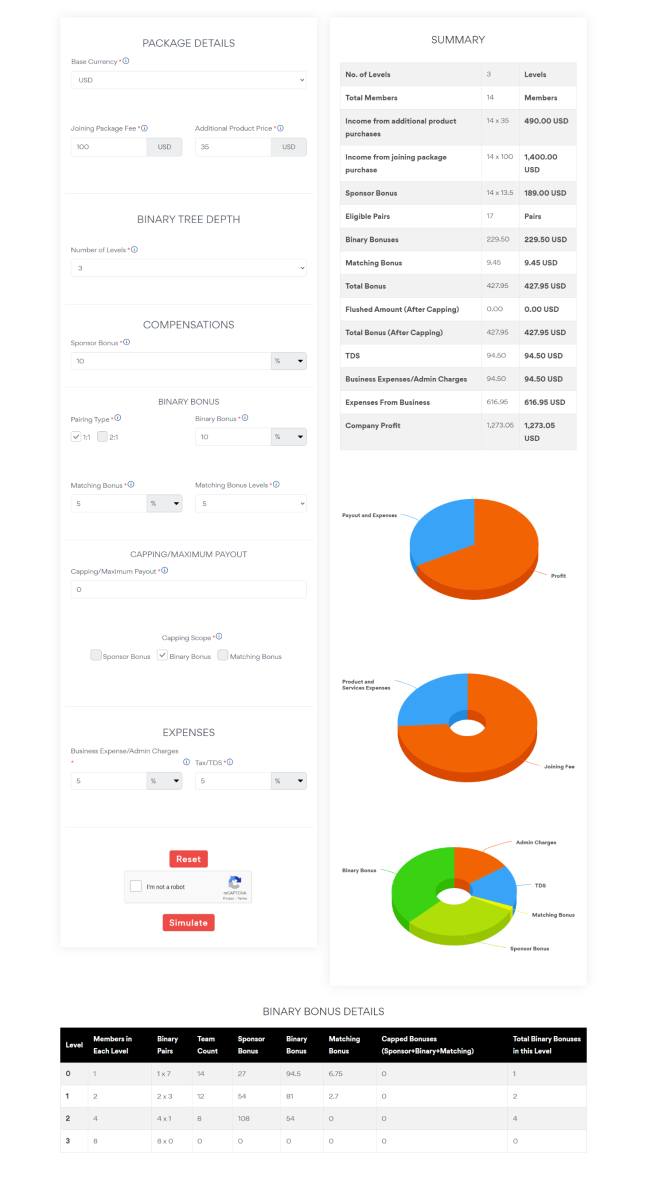
6. Inaccurate commission management
To cut corners and close the deal is a narrow path that will lead us to more troubles. This is reflected in compensation plans. Confusing and complex structures often trigger trust issues among distributors. When they fail to understand the compensation structure, performance and sales decrease, ultimately leading to overall failure.
Transparency is the key
It is one of the modest way to engage your distributors throughout the process.
While compensations are provided as commissions and bonuses, they must also exist in an easy-to-understand way within the MLM plans such as unilevel plan, matrix plan, and binary plan among others to pay their distributors accordingly.
Apart from that, implementing customizable commission structures can attract and retain their distributor teams. MLM businesses must tailor commission rates, bonuses, and rank advancements to specific performance metrics and sales targets. It builds brand loyalty, helps to maintain trust and transparency, motivates and retains distributors, and improves ROI.
So now it’s time to manage commissions effectively and drive your business in growth directions. Let's explore how to achieve this.
Calculating compensation for 20 members might not be complex but what if it expands?
Calculations get complex once the business starts to grow or once the distributor/customer base expands. Even though a system is capable of calculating a higher user base, there might occur a problem—calculation errors or flaws.
As a result, distributors won’t receive exact commissions or bonuses. What if an active distributor who created more opportunities didn’t receive what he actually achieved? What if the payout day was skipped and no one got the compensation?
Aren’t these factors too much to lose distributor/customer trust? What will be the final outcome of such situations?
Yes, FAILURE!
What they lack here is ACCURACY! If the system is accurate then there wouldn't have been an issue.
The solution is just a call away. Most MLM platforms have commission management features that enable businesses to calculate personal sales volume, group sales volume, commission percentages, profits and also to identify any flaws in commission structure. This automated system streamlines the intricate processes surrounding commissions and bonuses, ensuring seamless and prompt payouts.
Additionally, commission management feature powered by commission analytics delivers insights that helps in forecasting future commission earnings and optimizing sales strategies for distributors. This also assists in setting realistic income expectations and highlights areas for improvement and strategic adjustments.
7. Scalability issues
Scalability indicates the software’s ability to efficiently handle more work and traffic, whether it is expected or arises suddenly. This includes accommodating the addition or removal of users without incurring substantial costs. Consequently, a scalable solution is expected to maintain its stability and performance even in the face of a significant surge in traffic and workload.
One of the most pressing issues in the MLM context is the potential for increased users without adequate accommodation. This may lead to,
Downtime
As the number of users in an MLM business grows rapidly, the underlying infrastructure, websites, and servers can be strained beyond their capacity. This can lead to increased downtime, making it difficult for distributors to access their back-office systems, place orders, or perform other essential tasks.
Payment errors
Accommodating a larger user base necessitates managing a larger influx of transactions, including commission payments, bonuses, and product orders. When the payment systems lack robust scalability, then the likelihood of payment errors increases. Distributors may receive incorrect or delayed payments. This may foster dissatisfaction, disputes, and potential legal issues.
Commission calculation flaws
The heart of any MLM system is its commission structure. Accurate commission calculations are crucial for the fairness and sustainability of the MLM business. When the system isn't properly scaled to handle the complexity and volume of transactions it can result in incorrect commission disbursements. This, in turn, triggers dissatisfaction among distributors and financial discrepancies for the company.
Nearing the solution
Choosing the right software that aligns with your business requirements. This can keep scalability issues at bay. A scalable software can manage concurrent user requests, reduce downtime and errors, allow simultaneous user access, expand to meet growing storage needs and process higher transaction volumes with ease. Try out MLM software demo before deciding on the platform that supports your scalable business ventures.
Epixel MLM software champions a cutting-edge wave of business transformation by offering innovative and scalable MLM software solutions.These solutions cover potential bonuses and compensations, and foster healthy organizational practices, all tailored to empower distributors with new business opportunities for success and growth.
Discover how we build resilient businesses with advanced MLM functionalities
Check this article to ensure that you are taking into account all the factors to consider before choosing an MLM system.
We know that businesses grow from start-ups to enterprise level in no time. This triggers the necessity for expanding their operations. So, new direct sales companies must always ensure that they choose a MLM software package that is capable of managing the business and is stable to accommodate in the future.
8. Poor products and services
We learn that customer satisfaction is a gold mine for an MLM business to attain stability. MLM companies fail because of unaffordable product costs, compromised product value, and unsustainable and non-innovative products.
So before the launch, ensure that the products and services you offer are what you actually want, highly competitive, create an impact, and meet the expectation of the target market.
This means that they connect emotionally with customers, are marketable, and are priced accordingly.
9. Increased distributor attrition rates
Have you ever come across the terms "attrition rate" or "churn rate"? It serves as a significant metric that quantifies the turnover of distributors, aka salesforce, within an MLM company.
Distributor attrition rate represents the percentage of distributors who leave the company over a given period of time. It is a key metric for tracking the health of a company and identifying potential problems.
High distributor attrition rates in MLM companies can be attributed to several key factors, including:
Complex compensation plans with multiple tiers, qualifications, and bonus structures, leading to frustration and confusion among distributors.
Delayed commission payout as distributors do not receive their income promptly which diminishes trust and reliability in the company.
Inadequate training and lack of support where distributors feel unprepared and lack confidence to succeed as companies fail to provide comprehensive training programs, consistent guidance and sufficient resources.
Recruitment prioritization in some MLM companies as distributors feel pressurized in continuously building teams rather than product sales.
Product dissatisfaction that may lead to difficulties in acquiring and retaining distributors as well as customers if the company's products lack quality, value, or appeal.
These factors can be challenging for long term sustainability of the MLM businesses.
Attrition turnaround strategies
Identify the root causes of distributor attrition by conducting surveys, interviews with distributors, and analyzing sales data.
Offer competitive products, services, and pricing.
Provide distributors with the support they need that includes quality training, resources, and technical assistance.
Communicate effectively with distributors to keep them informed of new products, promotions, and other important information.
Build strong relationships with distributors to make them feel valued and respected.
Offer incentives to distributors tat could include loyalty programs, discounts, and early access to new products.

Attrition rates mirrors an organization's ability to engage, nurture, and retain its valuable assets – its distributors. Reducing attrition is closley linked to promoting sustainable growth, enhancing stability, and nurturing a positive work environment.
By implementing these strategies, network marketing sector can reduce attrition rates and build a loyal and motivated distributor network. Choosing this journey represents a step toward a brighter and more promising future for both individuals and the organizations they are a part of.
10. Adaptability challenges
Does failure to keep updated with the market trends make you outdated? When companies fail to adapt to the demands of the latest trends in the MLM industry or evolve with the ebb and flow, they lose relevance in the dynamic market.
Evolving as change unfolds
Using strategic approach + adapting to changing trends = expansion + growth.
This means sticking with,
Product trends
Staying attuned to evolving customer preferences, such as enhanced SPF in sunscreen, in response to increased awareness of skin protection.
Constant product improvements ensure customer satisfaction.
Upholding high-quality product standards establishes trust and brand credibility.
Diversifing product categories, like adding cosmetics to the sunscreen line under the same brand, help build loyal customer base.
Market trends
Identifying opportunities in new markets expands the reach of the business to tap into new customer bases.
Analyzing the customer demographics in the new market facilitates the tailoring of products and marketing strategies.
Customer preferences
Adapting to changing preferences that necessitates businesses to stay agile and adapt to the shifts in order to remain relevant.
Meeting competition requires constant innovation and the ability to offer products and services that stands out in a crowded marketplace.
Technology trends
Embracing the latest technological advancements such as AI, AR, and VR.
Redefining the retail experience, whether within traditional brick-and-mortar stores or in the world of online shopping.
Using advanced marketing tools with AI for business analysis.
The integration of these technologies enhances customer experience and engagement.
In order to maintain a competitive edge, the direct selling industry should wholeheartedly embrace adaptability by leveraging data, technology, and customer insights.
From MLM failures to tomorrow’s success stories
When your goal is growth, how well can you manage these setbacks one after another? Why does MLM fail?
As we have seen, the failure of many direct selling companies are rooted to the inherent flaws in their business practices. To protect the interests of distributors as well as customers and enhance their enduring presence in the competitive marketplace, fundamental changes are needed. It includes shift towards
A more product-centric approach,
Proper training sessions,
Transparent disclosures, and
Rigorous regulatory oversight
By implementing these changes, MLM companies can evolve into more ethical and sustainable business models.
Think now and build a promising future toward success.
- 1. Ineffective marketing strategies
- 2. Poor leadership and teamwork
- 3. Lack of proper training and support
- 4. Insufficient compliance
- 5. Unrealistic revenue expectation
- 6. Inaccurate commission management
- 7. Scalability issues
- 8. Poor products and services
- 9. Increased distributor attrition rates
- 10. Adaptability challenges





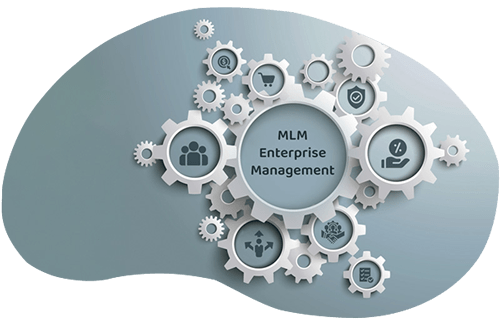



Leave your comment
Fill up and remark your valuable comment.